| 27 September |
• yesterday • tomorrow |
| Memorial of Saint Vincent de Paul, priest |
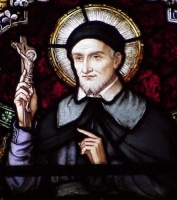
Born to a peasant family. A highly intelligent youth, Vincent spent four years with the Franciscan friars at Acq, France getting an education. Tutor to children of a gentlemen in Acq. He began divinity studies in 1596 at the University of Toulouse. Ordained at age 20.
Taken captive by Turkish pirates to Tunis, and sold into slavery. Freed in 1607 when he converted one of his owners to Christianity.
Returning to France, he served as parish priest near Paris where he started organizations to help the poor, nursed the sick, found jobs for the unemployed, etc. Chaplain at the court of Henry IV of France. With Louise de Marillac, founded the Congregation of the Daughters of Charity. Instituted the Congregation of Priests of the Mission (Lazarists). Worked always for the poor, the enslaved, the abandoned, the ignored, the pariahs.
• 24 April 1581 near Ranquine, Gascony near Dax, southwest France
• the town is now known as Saint-Vincent-de-Paul, Landes, France
• 27 September 1660 at Paris, France of natural causes
• body found incorrupt when exhumed in 1712
• body defleshed by a flood; skeleton encased in a wax effigy in the house of the Vincentian fathers in Paris
• heart incorrupt; displayed in a reliquary in the chapel of the motherhouse of the Sisters of Charity in Paris
13 August 1729 by Pope Benedict XIII
16 June 1737 by Pope Clement XII
• lepers; against leprosy
• charities; charitable societies (given on 12 May 1885 by Pope Leo XIII)
• charitable workers; volunteers
• horses
• hospital workers
• hospitals
• lost articles
• prisoners
• for spiritual help
• Madagascar
• Brothers of Charity
• Richmond, Virginia, diocese of
• Saint Vincent de Paul Societies
• Sisters of Charity
• Vincentian Service Corps
• 16th century cleric performing some act of charity
• cleric carrying an infant
• priest surrounded by the Sisters of Charity
• cannon ball and sword (referring to prisoners of war he ransomed)
• medals and pendants -
( page 01 )
( page 02 )
( page 03 )
( page 04 )
( page 05 )
( page 06 )
( page 07 )
( page 08 )
( page 09 )
( page 10 )
( page 11 )
( page 12 )
( page 13 )
• rosaries -
( page 01 )
( page 02 )
( page 03 )
However great the work that God may achieve by an individual, he must not indulge in self-satisfaction. He ought rather to be all the more humbled, seeing himself merely as a tool which God has made use of. - Saint Vincent de Paul
The Church teaches us that mercy belongs to God. Let us implore Him to bestow on us the spirit of mercy and compassion, so that we are filled with it and may never lose it. Only consider how much we ourselves are in need of mercy. - Saint Vincent de Paul
Extend your mercy towards others, so that there can be no one in need whom you meet without helping. For what hope is there for us if God should withdraw His Mercy from us? - Saint Vincent de Paul
The most powerful weapon to conquer the devil is humility. For, as he does not know at all how to employ it, neither does he know how to defend himself from it. - Saint Vincent de Paul
Free your mind from all that troubles you; God will take care of things. You will be unable to make haste in this (choice) without, so to speak, grieving the heart of God, because he sees that you do not honor him sufficiently with holy trust. Trust in him, I beg you, and you will have the fulfillment of what your heart desires. - Saint Vincent de Paul
It is our duty to prefer the service of the poor to everything else and to offer such service as quickly as possible. If a needy person requires medicine or other help during prayer time, do whatever has to be done with peace of mind. Offer the deed to God as your prayer. Charity is certainly greater than any rule. Moreover, all rules must lead to charity. - Saint Vincent de Paul
Human nature grows tired of always doing the same thing, and it is God's will that this because of the opportunity of practicing two great virtues. The first is perseverance, which will bring us to our goal. The other is steadfastness, which overcomes the difficulties on the way. - Saint Vincent de Paul
We should strive to keep our hearts open to the sufferings and wretchedness of other people, and pray continually that God may grant us that spirit of compassion which is truly the spirit of God. - Saint Vincent de Paul
Humility and charity are the two master-chords: one, the lowest; the other, the highest; all the others are dependent on them. Therefore it is necessary, above all, to maintain ourselves in these two virtues; for observe well that the preservation of the whole edifice depends on the foundation and the roof. - Saint Vincent de Paul
As it is most certain that the teaching of Christ cannot deceive, if we would walk securely, we ought to attach ourselves to it with greatest confidence and to profess openly that we live according to it, and not to the maxims of the world, which are all deceitful. This is the fundamental maxim of all Christian perfection. - Saint Vincent de Paul
We have never so much cause for consolation, as when we find ourselves oppressed by sufferings and trials; for these make us like Christ our Lord, and this resemblance is the true mark of our predestination. - Saint Vincent de Paul
Perfection consists in one thing alone, which is doing the will of God. For, according to Our Lord's words, it suffices for perfection to deny self, to take up the cross and to follow Him. Now who denies himself and takes up his cross and follows Christ better than he who seeks not to do his own will, but always that of God? Behold, now, how little is needed to become as Saint? Nothing more than to acquire the habit of willing, on every occasion, what God wills. - Saint Vincent de Paul
He who allows himself to be ruled or guided by the lower and animal part of his nature, deserves to be called a beast rather than a man. - Saint Vincent de Paul
Whoever wishes to make progress in perfection should use particular diligence in not allowing himself to be led away by his passions, which destroy with one hand the spiritual edifice which is rising by the labors of the other. But to succeed well in this, resistance should be begun while the passions are yet weak; for after they are thoroughly rooted and grown up, there is scarcely any remedy. - Saint Vincent de Paul
The first step to be taken by one who wishes to follow Christ is, according to Our Lord's own words, that of renouncing himself - that is, his own senses, his own passions, his own will, his own judgement, and all the movements of nature, making to God a sacrifice of all these things, and of all their acts, which are surely sacrifices very acceptable to the Lord. And we must never grow weary of this; for if anyone having, so to speak, one foot already in Heaven, should abandon this exercise, when the time should come for him to put the other there, he would run much risk of being lost. - Saint Vincent de Paul
We ought to deal kindly with all, and to manifest those qualities which spring naturally from a heart tender and full of Christian charity; such as affability, love and humility. These virtues serve wonderfully to gain the hearts of men, and to encourage them to embrace things that are more repugnant to nature. - Saint Vincent de Paul
It ought to be considered a great misfortune, not only for individuals, but also for Houses and Congregations, to have everything in conformity with their wishes; to go on quietly, and to suffer nothing for the love of God. Yes, consider it certain that a person or a Congregation that does not suffer and is applauded by all the world is near a fall. - Saint Vincent de Paul
Even though the poor are often rough and unrefined, we must not judge them from external appearances nor from the mental gifts they seem to have received. On the contrary, if you consider the poor in the light of faith, then you will observe that they are taking the place of the Son of God who chose to be poor. Although in his passion he almost lost the appearance of a man and was considered a fool by the Gentiles and a stumbling block by the Jews, he showed them that his mission was to preach to the poor: "He sent me to preach the good news to the poor." We also ought to have this same spirit and imitate Christ's actions, that is, we must take care of the poor, console them, help them, support their cause. Since Christ willed to be born poor, he chose for himself disciples who were poor. He made himself the servant of the poor and shared their poverty. He went so far as to say that he would consider every deed which either helps or harms the poor as done for or against himself. Since God surely loves the poor, he also love whose who love the poor. For when on person holds another dear, he also includes in his affection anyone who loves or serves the one he loves. That is why we hope that God will love us for the sake of the poor. So when we visit the poor and needy, we try to be understanding where they are concerned. We sympathize with them so fully that we can echo Paul's words: "I have become all things to all men." Therefore, we must try to be stirred by our neighbors' worries and distress. It is our duty to prefer the service of the poor to everything else and to offer such service as quickly as possible. Charity is certainly greater than any rule. Moreover, all rules must lead to charity. With renewed devotion, then, we must serve the poor, especially outcasts and beggars. They have been given to us as our masters and patrons. - Saint Vincent de Paul
https://catholicsaints.info/saint-vincent-de-paul/

Born to the Italian nobility, Lorenzo’s family had a military history and a duty to protect the outer defenses of the city of Pisa, Italy. Lorenzo, however, was drawn to the religious life, began studying for the priesthood, and while a deacon, he joined the Dominicans at the convent of Saint Catherine in Pisa in 1396. Priest. He worked for reform of the Dominicans and encouraged his brother friars in their studies, prayer life, and devotion to the Rule. Lorenzo served as novice master, spiritual director and preacher, and taught theology; his novices and students include Saint Antonius of Florence, Blessed Peter Cappuci, Blessed Fra Angelico and the artist Fra Benedetto. Vicar-general of the congregation. He worked with the sick during plague outbreaks in the Italian cities of Pistoia and Fabriano. Father Lorenzo served for 60 years, lived a simple, ascetic life, and was particularly devoted to the sacrament of Penance and Reconciliation.
c.1373 in Ripafratta, Italy
• 1456 in Pistoia, Tuscany, Italy of natural causes
• buried at the Dominican church in Pistoia
• miracles reported at his tomb
1851 by Pope Pius IX (cultus confirmation)
https://catholicsaints.info/blessed-lorenzo-of-ripafratta/

Delphina
Born to the nobility, daughter of the Lord of Puimichel, France. Orphaned in infancy; raised by her aunt, the abbess of the convent of Saint Catherine in Sorbo. Franciscan tertiary. Married at age 16 to Saint Elzear, Count of Sarban, Franciscan tertiary, and godfather to Pope Urban V; the couple lived chastely. Became a lady in waiting to Queen Sanchia in Naples. Widow, Elzear dying of natural causes while on a trip to Paris, France. When Queen Sanchia died, she sold her vast estates, gave the proceeds to the poor, and retired to Provence where she lived her remaining years in seclusion.
1283 at the Chateau-Puimichel in Languedoc (modern Puy-en-Velay, France)
• 26 November 1360 of natural causes
• buried next to Elzear at Apt, France
1694 by Pope Innocent XII (cultus confirmation)
• brides
• tertiaries
• Ariano Irpino-Lacedonia, Italy, diocese of
https://catholicsaints.info/blessed-delphine/
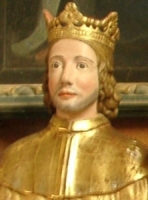
Eleazarus
Born to the nobility. Nephew of William of Sabron, abbot of Saint Victor's abbey, Marseilles, France, where Elzear was educated. Franciscan tertiary. Married to Saint Delphina at age 16, with whom he lived chastely the rest of his life. Count of Ariano in Naples, Italy upon his father's death. Uncle and godfather of Pope Urban V. Tutor to the son of King Robert of Naples in 1317. Diplomat for King Robert. Died while on a trip to arrange a marriage for Prince Charles. Known especially for his happy, loving, Christian marriage and his deep personal prayer life.
1285 at Ansouis, Provence, France
• 27 September 1323 in Paris, France of natural causes
• buried next to Blessed Delphine at Apt, France
1369 by Pope Urban V
• tertiaries
• Ariano Irpino-Lacedonia, Italy, diocese of
https://catholicsaints.info/saint-elzear/
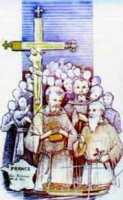
Priest in the diocese of Maçon, France. Imprisoned on a ship in the harbor of Rochefort, France and left to die during the anti-Catholic persecutions of the French Revolution. One of the Martyrs of the Hulks of Rochefort.
19 September 1734 in Maçon, Saône-et-Loire, France
27 September 1794 aboard the prison ship Deux-Associés, in Rochefort, Charente-Maritime, France
1 October 1995 by Pope John Paul II
https://catholicsaints.info/blessed-jean-baptiste-laborie-du-vivier/
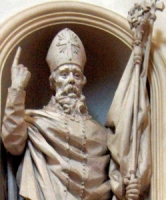
Born to the nobility. Benedictine monk and then abbot of Santa Maria di Storaco Abbey where he was known for his knowledge of the scriptures. Priest. Noted and popular preacher. Bishop of Foligno, Italy in 1078. Pilgrim and Crusader to the Holy Lands from 1096 to 1104, after which he retired from his see to return to life as a monk. His biography was written by Saint Sylvester Guzzolini.
1040 in Osimo, Italy
1125 of natural causes
https://catholicsaints.info/saint-bonfilius-of-foligno/
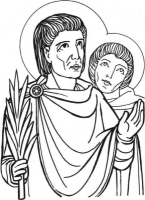
Brothers, born to a Moorish father and a Christian mother. Martyred in the persecutions of Abderrahman II.
Seville, Spain
martyred c.850 in Corboba, Spain
https://catholicsaints.info/saint-adolphus-of-cordoba/
https://catholicsaints.info/saint-john-of-cordoba/
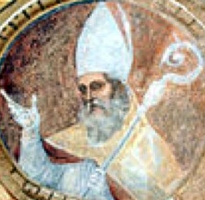
Caius of Milan
Spiritual student of Saint Barnabas the Apostle. First century bishop of Milan, Italy for 24 years. Baptized Saint Vitalis, Saint Gervase and Saint Protase.
• c.85
• relics enshrined by Saint Charles Borromeo at the church of Saint Francis, Milan, Italy in 1571
https://catholicsaints.info/saint-gaius-of-milan/
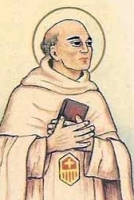
Mercedarian. Assigned to north Africa, he was repeatedly beaten and abused by Muslims, but managed for free 121 Christians who had been enslaved by them.
https://catholicsaints.info/blessed-lorenzo-della-pieta/
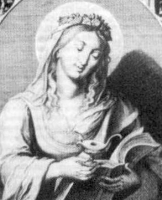
Recluse near Liessies, France under the spiritual direction of her brother Gundrad, abbot of the nearby monastery.
c.790 of natural causes
https://catholicsaints.info/saint-hiltrude-of-liessies/
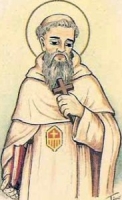
Mercedarian friar known as a man wholly devoted to God. In Algiers in North Africa, he ransomed and freed 80 Christians who had been enslaved by Muslims.
https://catholicsaints.info/blessed-antonio-de-torres/
Barrwg, Barnoch, Barruc, Barry, Barroq, Barnoc
Seventh century spiritual student of Saint Cadoc of Wales. Hermit on an island off the coast of Glamorgan, a piece of land now known as Barry Island in his honour.
https://catholicsaints.info/saint-barrog-the-hermit/
Adhentus, Abderitus, Adery
Priest. Bishop of Ravenna, Italy.
Greek
• 2nd century in Ravenna, Italy of natural causes
• relics in the Benedictine Basilica of Classe, Ravenna, Italy
https://catholicsaints.info/saint-adheritus/
Ceran of Paris
Bishop of Paris, France.
• c.614 of natural causes
• relics enshrined in the church of Saint Genevieve, Paris, France
https://catholicsaints.info/saint-ceraunus-of-paris/
Fidenzio of Todi
Martyr.
relics discovered in Todi, Italy in the 12th century
Bassano in Teverina, Italy
https://catholicsaints.info/saint-fidentius-of-todi/
Florentino
Hermit. Martyr.
beheaded by Vandals in 5th century Sedunum, Gaul (modern Brémur, France)
https://catholicsaints.info/saint-florentinus-the-hermit/
Terenzio, Terentius
Martyr.
relics discovered in Todi, Italy in the 12th century
Bassano in Teverina, Italy
https://catholicsaints.info/saint-terence-of-todi/
Martyr.
• in Sora, Italy, date unknown
• relics enshrined in the cathedral in Sora in 1621
https://catholicsaints.info/saint-deodatus-of-sora/
Monk at Saint Gall Abbey in Switzerland.
Ireland
c.869
https://catholicsaints.info/saint-marcellus-of-saint-gall/
Martyred in the persecutions of Diocletian.
in Byzantium
https://catholicsaints.info/saint-epicharis/
Hermit. Martyr.
France
https://catholicsaints.info/saint-hilary-the-hermit/
Three Christians martyred with Saints Cosmas and Damian in the persecutions of Diocletian - Anthimus, Euprepius and Leontius.
tortured and beheaded c.303 in Aegea, Cilicia (modern Ayas, Turkey)
https://catholicsaints.info/martyrs-of-aegea/
Thousands of people were murdered in the anti-Catholic persecutions of the Spanish Civil War from 1934 to 1939. I have pages on each of them, but in most cases I have only found very minimal information. They are available on the CatholicSaints.Info site through these links:
• Blessed Crescencia Valls Espí
• Blessed Herminia Martínez Amigó de Martínez
• Blessed José Fenollosa Alcaina
• Blessed Maria Carme Fradera Ferragutcasas
• Blessed Maria Magdalena Fradera Ferragutcasas
• Blessed Maria Rosa Fradera Ferragutcasas
• Blessed Mariano Climent Sanchis
• Chiara of the Resurrection
• Mary of the Purification
• Paul Sanson
• Sigebert II of East Anglia
CatholicSaints.Info Portable Edition